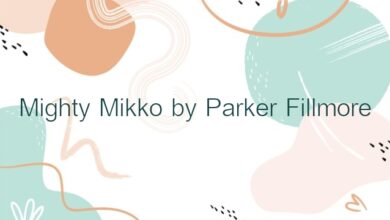
The Goose Girl and the Blue Gander by Loretta Ellen Brady
The Goose Girl and the Blue Gander from Brady’s collection, The Green Forest Fairy Book (1920), will make them wish they had a goose or a gander who could speak!
The Goose Girl and the Blue Gander
Once upon a time there was a goose girl who tended her flock in a green meadow. The meadow was dotted with forget-me-nots and yellow buttercups, and the sun shone down on it; her geese were fine blue geese and uncommonly knowing. She should have been the happiest goose girl in all the world, but she was not. She thought not of the beautiful meadow nor of her geese that were a pleasure to tend, for they were so wise and always did her bidding; but instead this goose girl wept every day because she longed to marry a certain lord who lived in a gray stone castle at the top of a high hill. All day long she sat looking at this castle, and her eyes could see nothing else for admiration of it. She dreamed dreams a hundred times a day, in which she married the lord, and was cross with her geese because she had to tend them.
Now when the lord of the castle went riding by the green meadow, this silly goose girl would run after the carriage, shouting his name and throwing bouquets of wild flowers to him. But alas! The carriage always whirled by so quickly that the lord heard her not, and the bouquets of wild flowers fell in the dust by the roadside. Each time the goose girl wept and threw sticks at her geese because she had been disappointed, until they fled to shelter.
“It is the stupid coachman’s fault,” said the goose girl to herself one day, after she had chased the carriage for a long distance. “My lord is within, of course, and cannot hear me, for the windows of glass shut out all sound.” She knew that maidens often wrote letters when they were unable to obtain speech with those whom they fancied, and she resolved to write to the lord of the gray stone castle.
She spent her year’s earnings on some pink paper with red hearts lovingly entwined on the border, and that her letter might be colorful and splendid, she bought also some purple ink. Then the goose girl sat before a flat rock and strove to compose such a letter to the lord that he would stop his carriage the next time he rode by the meadow.
“The first day he will ask me to ride with him, and the second day he will ask me to wed him,” thought the goose girl, as she sat gazing at the gray stone castle. “The third day I shall ride with him a bride to yonder castle, where I shall dwell forevermore and have naught to do with geese but to eat them roasted!”
Her geese, thinking perhaps she had spread on the rock something fine to eat, crowded about her, but she drove them off. They bothered her, and she wished to give her mind to the letter. One large blue gander remained near, in spite of her angry motions and cross words. The goose girl was about to begin her letter when she remembered that she had brought no pen.
“Ah me! What shall I do?” she cried. “I shall have no more earnings for another year, and by that time my lord may be wed to some fair maiden, and I will surely die of a broken heart!” She covered her face and wept aloud at her misfortune. Suddenly she began to laugh instead.
“Oh, that I should be so foolish!” she exclaimed. “Here waiting my hand I have a hundred pens.” She seized the large blue gander and plucked a fine quill from under his wing, but no sooner had she done so than the bird began to speak.
“That is not right,” declared the gander. “You have taken what belongs not to you but to me. Put back my quill, or I shall be vexed.”
“And who is there to care?” replied the goose girl rudely. “When I have written a letter to my lord of the gray stone castle, you shall have your quill and not before.”
She began to speak her thoughts aloud, as goose girls often do, and started once more to compose the letter. “To my dearest lord of the gray stone castle, whom I love with all my heart, but who whirls past me as I sit tending geese in the meadow,” she planned to write, and dipped the quill in the purple ink. To her dismay the pen wrote not at all as she planned, but seemed possessed of a spirit to go of itself. It wrote with a remarkable flourish:
“Dear gander!”
But the goose girl pulled it from the paper before it could write more.
“What manner of pen is this?” she cried in vexation.
“It is not your quill,” said the blue gander. “I am its master, and it will write letters to none but me.”
“Well, upon my word!” declared the goose girl. “You are the most forward creature I have yet seen, and this is what you will get.” She took a long branch and beat the gander until he hid from sight in the bushes. Then again she strove to write her letter, but again the pen was possessed of a spirit of mischief.
“Oh! Oh!” wept the goose girl, “I have spent all my earnings on splendid pink paper with red hearts lovingly entwined on the border, and purple ink I bought also that my letter might be fine as a valentine. But, alas! I am bothered with a stubborn quill that will not write as I think. If I write not my letter to my lord, he will never know of me. Then he will never marry me, and I shall dwell forever in my wretched hut instead of the gray stone castle, as I have desired.”
“You weep because you cannot marry the lord who lives in yonder gray stone castle,” said the blue gander, poking his long neck from the bushes where he had fled. “Let me give you some advice. A wretched hut is not a pleasant place, ‘tis true, but your manners suit it better than the castle of your dreams.”
“Hold your tongue, forward bird!” screamed the goose girl in anger. She seized a clod of earth and hurled it with such force that had it struck the gander, he would have fallen flat in his tracks; but luck was with him, and he dodged.
The next day and the next day after that the goose girl sat down to write before the flat rock in the meadow; but the quill was stubborn as ever. She spoiled all but one sheet of the precious pink paper. Then once more the blue gander spoke to the goose girl.
“You have spoiled many sheets of your precious pink paper,” said the gander, nodding his head and cocking his eye in the wisest sort of way. “Why will you not let the quill write a letter to me,—if only to see what will happen?”
“But then I shall have no more paper on which to write to my lord, and I shall dwell forever in my wretched hut instead of the castle of my dreams,” answered the goose girl.
“Mayhap there might be a betwixt and between,” remarked the gander sagely. “Write the letter and hand it to me with a bow.”
So at last, after much thought, the goose girl did as the blue gander bade. She dipped the quill in the purple ink, and immediately it touched the paper it began to write such a marvelous letter as never before was seen or read! It called the blue gander all manner of tender names and vowed he was handsome and knowing. At the end, this remarkable quill wrote the goose girl’s name with a flourish so fine that she was pleased in spite of herself. She folded the letter and handed it to the gander with a bow.
No sooner had she done this than the blue gander spread his wings and flew away in the clouds, and in his place stood a handsome shepherd lad dressed in blue corduroys. He had a hundred sheep in the fold that followed him, and in his hand a bag of silver.
“Dearest Goose Girl, wilt be mine?” asked he. “Yonder is my cottage, where I am sure we shall be very happy.”
The goose girl was amazed at the change. But so handsome was this young shepherd lad, and so winning of speech and manner, that all thoughts of the gray stone castle and the lord tumbled out of her head. She gazed with delight at the little cottage to which the shepherd lad pointed. Blue smoke was curling from its chimney, and a bluebird was singing in a cage beside the kitchen door.
“We shall be married at once, shepherd lad of my heart,” she answered him sweetly, “and I shall make you griddlecakes for your supper.”
So the goose girl and the shepherd were married and went to live in the little cottage. Indeed, for all that I know, there they may be living to this day, for I have met no one who has ever told me of the death of either.




